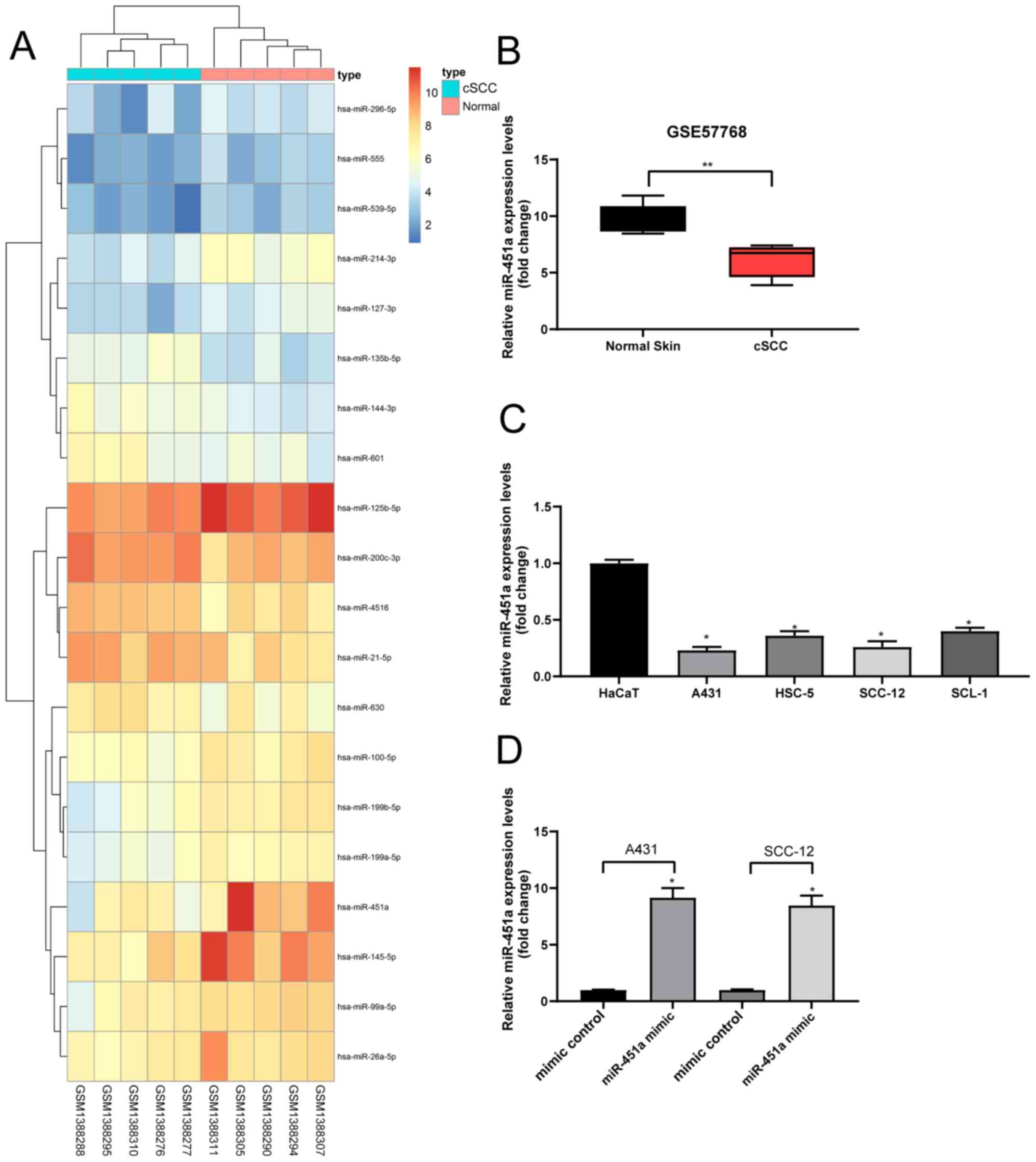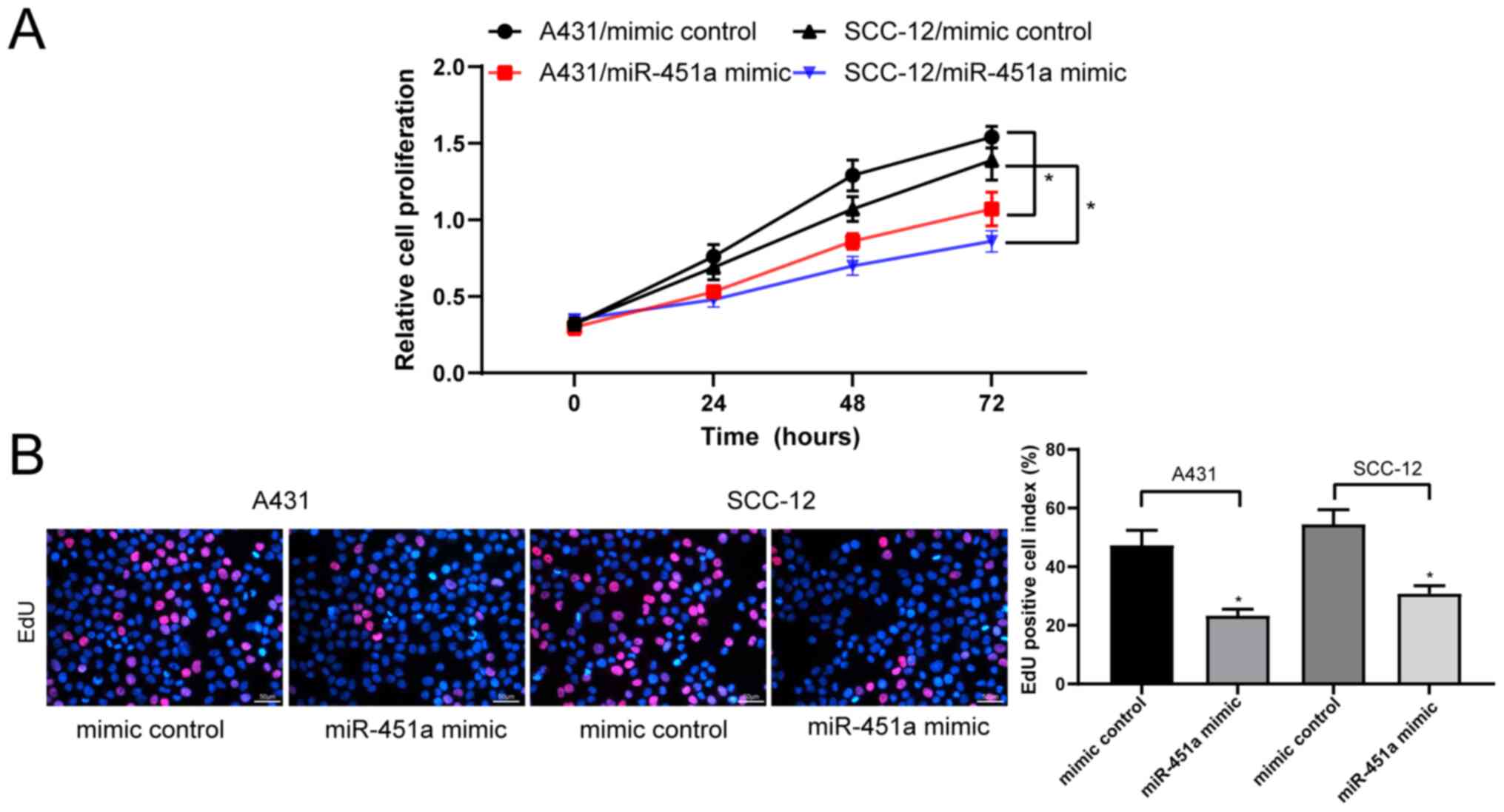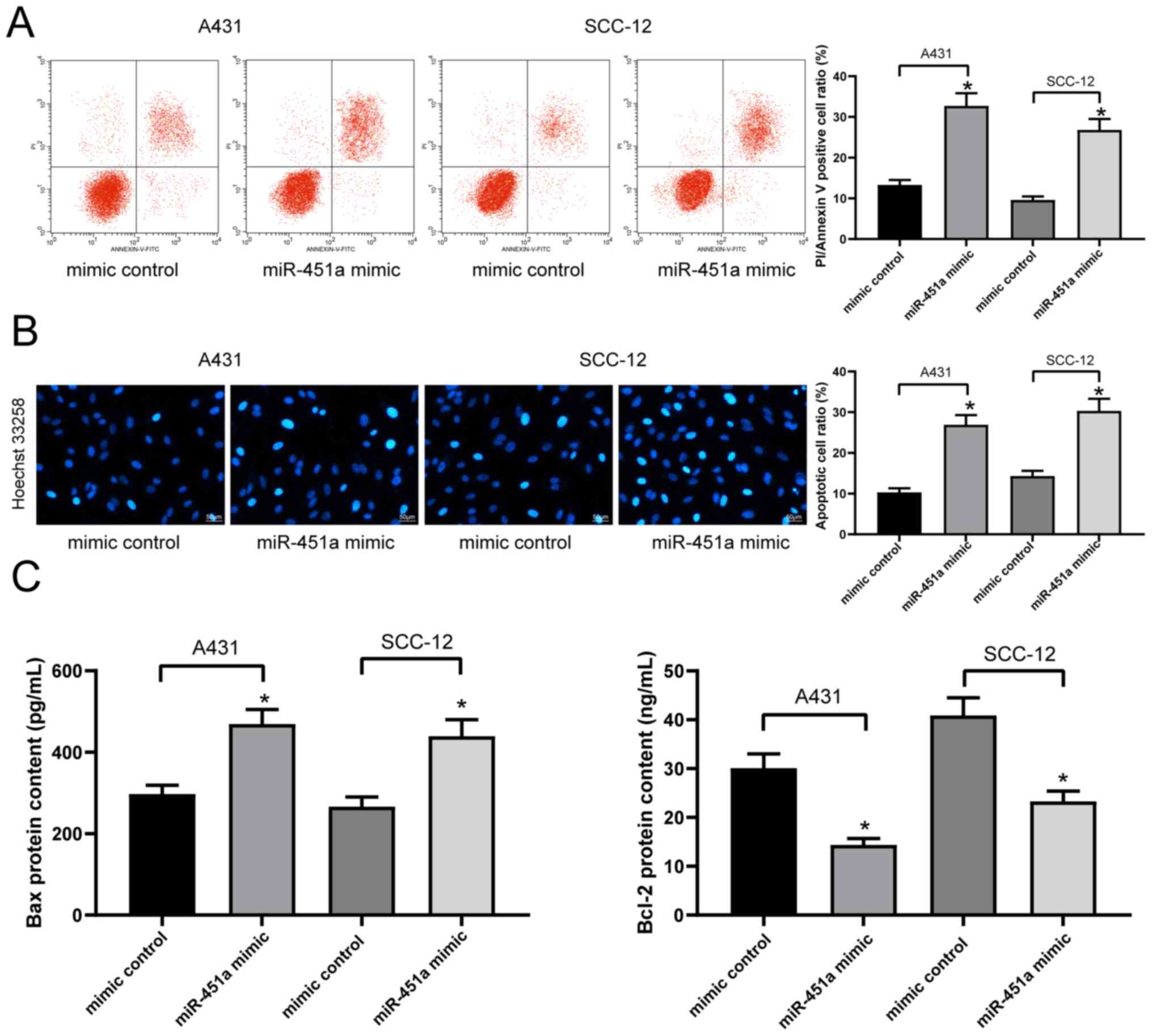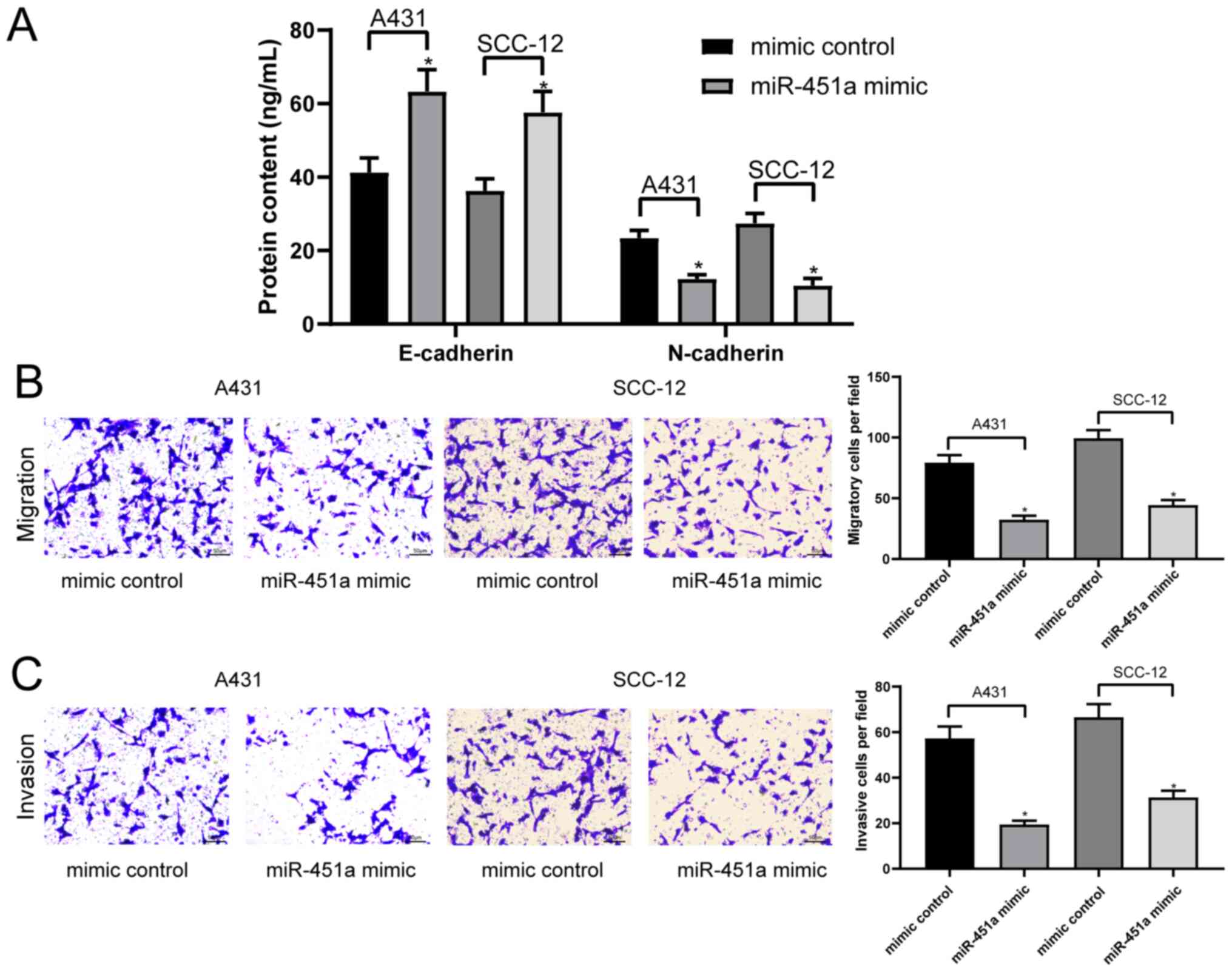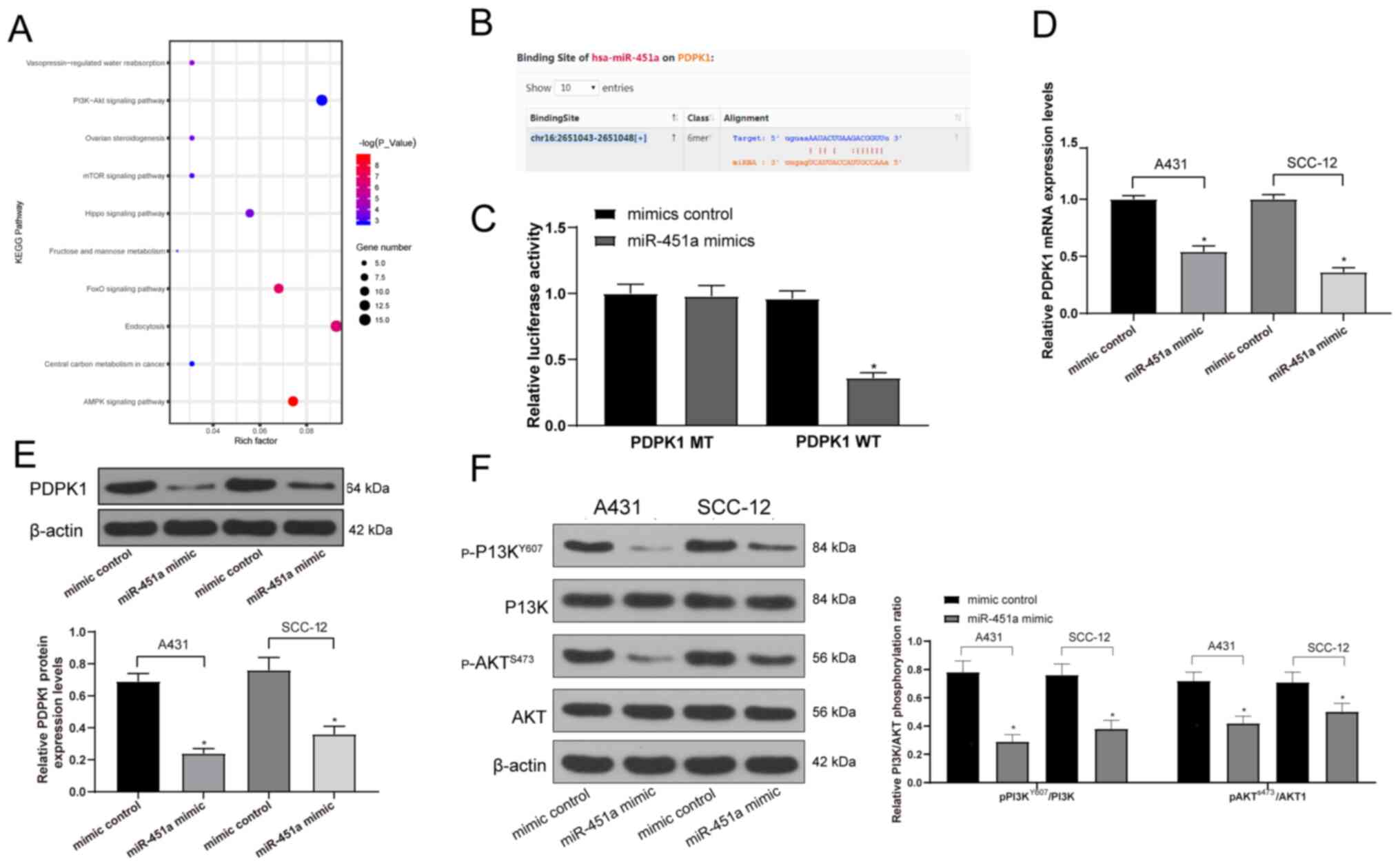|
1
|
Gordon R: Skin cancer: An overview of
epidemiology and risk factors. Semin Oncol Nurs. 29:160–169.
2013.PubMed/NCBI View Article : Google Scholar
|
|
2
|
Siegel RL, Miller KD and Jemal A: Cancer
statistics, 2020. CA Cancer J Clin. 70:7–30. 2020.PubMed/NCBI View Article : Google Scholar
|
|
3
|
Linares MA, Zakaria A and Nizran P: Skin
Cancer. Prim Care. 42:645–659. 2015.PubMed/NCBI View Article : Google Scholar
|
|
4
|
Lomas A, Leonardi-Bee J and Bath-Hextall
F: A systematic review of worldwide incidence of nonmelanoma skin
cancer. Br J Dermatol. 166:1069–1080. 2012.PubMed/NCBI View Article : Google Scholar
|
|
5
|
Dubas LE and Ingraffea A: Nonmelanoma skin
cancer. Facial Plast Surg Clin North Am. 21:43–53. 2013.PubMed/NCBI View Article : Google Scholar
|
|
6
|
Green AC and Olsen CM: Cutaneous squamous
cell carcinoma: An epidemiological review. Br J Dermatol.
177:373–381. 2017.PubMed/NCBI View Article : Google Scholar
|
|
7
|
Harris RB, Griffith K and Moon TE: Trends
in the incidence of nonmelanoma skin cancers in southeastern
Arizona, 1985-1996. J Am Acad Dermatol. 45:528–536. 2001.PubMed/NCBI View Article : Google Scholar
|
|
8
|
Jung GW, Metelitsa AI, Dover DC and
Salopek TG: Trends in incidence of nonmelanoma skin cancers in
Alberta, Canada, 1988-2007. Br J Dermatol. 163:146–154.
2010.PubMed/NCBI View Article : Google Scholar
|
|
9
|
Robsahm TE, Helsing P and Veierod MB:
Cutaneous squamous cell carcinoma in Norway 1963-2011: Increasing
incidence and stable mortality. Cancer Med. 4:472–480.
2015.PubMed/NCBI View
Article : Google Scholar
|
|
10
|
Parekh V and Seykora JT: Cutaneous
squamous cell carcinoma. Clin Lab Med. 37:503–525. 2017.PubMed/NCBI View Article : Google Scholar
|
|
11
|
Konicke K, Lopez-Luna A, Munoz-Carrillo
JL, Servín-González LS, Flores-de la Torre A, Olasz E and Lazarova
Z: The microRNA landscape of cutaneous squamous cell carcinoma.
Drug Discov Today. 23:864–870. 2018.PubMed/NCBI View Article : Google Scholar
|
|
12
|
Horsburgh S, Fullard N, Roger M, Degnan A,
Todryk S, Przyborski S and O'Reilly S: MicroRNAs in the skin: Role
in development, homoeostasis and regeneration. Clin Sci (Lond).
131:1923–1940. 2017.PubMed/NCBI View Article : Google Scholar
|
|
13
|
García-Sancha N, Corchado-Cobos R,
Pérez-Losada J and Cañueto JJ: MicroRNA dysregulation in cutaneous
squamous cell carcinoma. Int J Mol Sci. 20(2181)2019.PubMed/NCBI View Article : Google Scholar
|
|
14
|
Sun H and Jiang P: MicroRNA-451a acts as
tumor suppressor in cutaneous basal cell carcinoma. Mol Genet
Genomic Med. 6:1001–1009. 2018.PubMed/NCBI View
Article : Google Scholar
|
|
15
|
Wada M, Horinaka M, Yasuda S, Masuzawa M,
Sakai T and Katoh N: PDK1 is a potential therapeutic target against
angiosarcoma cells. J Dermatol Sci. 78:44–50. 2015.PubMed/NCBI View Article : Google Scholar
|
|
16
|
Wei Y, Liao Y, Deng Y, Zu Y, Zhao B and Li
F: MicroRNA-503 Inhibits non-small cell lung cancer progression by
targeting PDK1/PI3K/AKT Pathway. Onco Targets Ther. 12:9005–9016.
2019.PubMed/NCBI View Article : Google Scholar
|
|
17
|
Gillespie J, Skeeles LE, Allain DC, Kent
MN, Peters SB, Nagarajan P, Yu L, Teknos TN, Olencki T and Toland
AE: MicroRNA expression profiling in metastatic cutaneous squamous
cell carcinoma. J Eur Acad Dermatol Venereol. 30:1043–1045.
2016.PubMed/NCBI View Article : Google Scholar
|
|
18
|
Kanehisa M and Goto S: KEGG: Kyoto
encyclopedia of genes and genomes. Nucleic Acids Res. 28:27–30.
2000.PubMed/NCBI View Article : Google Scholar
|
|
19
|
Kanehisa M: Toward understanding the
origin and evolution of cellular organisms. Protein Sci.
28:1947–1951. 2019.PubMed/NCBI View
Article : Google Scholar
|
|
20
|
Livak KJ and Schmittgen TD: Analysis of
relative gene expression data using real-time quantitative PCR and
the 2(-Delta Delta C(T)) method. Methods. 25:402–408.
2001.PubMed/NCBI View Article : Google Scholar
|
|
21
|
Yu GJ, Sun Y, Zhang DW and Zhang P: Long
non-coding RNA HOTAIR functions as a competitive endogenous RNA to
regulate PRAF2 expression by sponging miR-326 in cutaneous squamous
cell carcinoma. Cancer Cell Int. 19(270)2019.PubMed/NCBI View Article : Google Scholar
|
|
22
|
Tian J, Shen R, Yan Y and Deng L: miR-186
promotes tumor growth in cutaneous squamous cell carcinoma by
inhibiting apoptotic protease activating factor-1. Exp Ther Med.
16:4010–4018. 2018.PubMed/NCBI View Article : Google Scholar
|
|
23
|
Song H, Tao Y, Ni N, Zhou X, Xiong J, Zeng
X, Xu X, Qi J and Sun J: miR-128 targets the CC chemokine ligand 18
gene (CCL18) in cutaneous malignant melanoma progression. J
Dermatol Sci. 91:317–324. 2018.PubMed/NCBI View Article : Google Scholar
|
|
24
|
Zhang Y, Guo L, Li Y, Feng GH, Teng F, Li
W and Zhou Q: MicroRNA-494 promotes cancer progression and targets
adenomatous polyposis coli in colorectal cancer. Mol Cancer.
17(1)2018.PubMed/NCBI View Article : Google Scholar
|
|
25
|
Fernandez-Figueras MT and Puig L: The role
of epithelial-to-mesenchymal transition in cutaneous squamous cell
carcinoma: Epithelial-to-mesenchymal transition in cutaneous SCC.
Curr Treat Options Oncol. 21(47)2020.PubMed/NCBI View Article : Google Scholar
|
|
26
|
Ci C, Wu C, Lyu D, Chang X, He C, Liu W,
Chen L and Ding W: Downregulation of kynureninase restrains
cutaneous squamous cell carcinoma proliferation and represses the
PI3K/AKT pathway. Clin Exp Dermatol. 45:194–201. 2020.PubMed/NCBI View Article : Google Scholar
|
|
27
|
Mei XL and Zhong S: Long noncoding RNA
LINC00520 prevents the progression of cutaneous squamous cell
carcinoma through the inactivation of the PI3K/Akt signaling
pathway by downregulating EGFR. Chin Med J (Engl). 132:454–465.
2019.PubMed/NCBI View Article : Google Scholar
|
|
28
|
Karia PS, Morgan FC, Ruiz ES and Schmults
CD: Clinical and incidental perineural invasion of cutaneous
squamous cell carcinoma: A systematic review and pooled analysis of
outcomes data. JAMA Dermatol. 153:781–788. 2017.PubMed/NCBI View Article : Google Scholar
|
|
29
|
Gao Z, Zhang P, Xie M, Gao H, Yin L and
Liu R: miR-144/451 cluster plays an oncogenic role in esophageal
cancer by inhibiting cell invasion. Cancer Cell Int.
18(184)2018.PubMed/NCBI View Article : Google Scholar
|
|
30
|
Wei GY, Hu M, Zhao L and Guo WS: MiR-451a
suppresses cell proliferation, metastasis and EMT via targeting
YWHAZ in hepatocellular carcinoma. Eur Rev Med Pharmacol Sci.
23:5158–5167. 2019.PubMed/NCBI View Article : Google Scholar
|
|
31
|
Latchana N, Abrams ZB, Howard JH, Regan K,
Jacob N, Fadda P, Terando A, Markowitz J, Agnese D, Payne P and
Carson WE III: Plasma MicroRNA levels following resection of
metastatic melanoma. Bioinform Biol Insights Feb 23, 2017 (Epub
ahead of print). doi: 10.1177/1177932217694837.
|
|
32
|
Babapoor S, Fleming E, Wu R and Dadras SS:
A novel miR-451a isomiR, associated with amelanotypic phenotype,
acts as a tumor suppressor in melanoma by retarding cell migration
and invasion. PLoS One. 9(e107502)2014.PubMed/NCBI View Article : Google Scholar
|
|
33
|
Hodorogea A, Calinescu A, Antohe M,
Balaban M, Nedelcu RI, Turcu G, Ion DA, Badarau IA, Popescu CM,
Popescu R, et al: Epithelial-mesenchymal transition in skin
cancers: A review. Anal Cell Pathol (Amst).
2019(3851576)2019.PubMed/NCBI View Article : Google Scholar
|
|
34
|
Ma X, Li D, Gao Y and Liu C: miR-451a
Inhibits the growth and invasion of osteosarcoma via targeting
TRIM66. Technol Cancer Res Treat.
18(1533033819870209)2019.PubMed/NCBI View Article : Google Scholar
|
|
35
|
Lin JX, Xie XS, Weng XF, Qiu SL, Yoon C,
Lian NZ, Xie JW, Wang JB, Lu J, Chen QY, et al: UFM1 suppresses
invasive activities of gastric cancer cells by attenuating the
expres7sion of PDK1 through PI3K/AKT signaling. J Exp Clin Cancer
Res. 38(410)2019.PubMed/NCBI View Article : Google Scholar
|
|
36
|
Fan X and Zhao Y: miR-451a inhibits cancer
growth, epithelial-mesenchymal transition and induces apoptosis in
papillary thyroid cancer by targeting PSMB8. J Cell Mol Med.
23:8067–8075. 2019.PubMed/NCBI View Article : Google Scholar
|
|
37
|
Zhong L, Liao G, Wang X, Li L, Zhang J,
Chen Y, Liu J, Liu S, Wei L, Zhang W and Lu Y: Mesenchymal stem
cells-microvesicle-miR-451a Ameliorate early diabetic kidney injury
by negative regulation of P15 and P19. Exp Biol Med (Maywood).
243:1233–1242. 2018.PubMed/NCBI View Article : Google Scholar
|
|
38
|
Di Blasio L, Gagliardi PA, Puliafito A and
Primo L: Serine/threonine kinase 3-phosphoinositide-dependent
protein kinase-1 (PDK1) as a key regulator of cell migration and
cancer dissemination. Cancers (Basel). 9(25)2017.PubMed/NCBI View Article : Google Scholar
|
|
39
|
Gagliardi PA, di Blasio L and Primo L:
PDK1: A signaling hub for cell migration and tumor invasion.
Biochim Biophys Acta. 1856:178–188. 2015.PubMed/NCBI View Article : Google Scholar
|
|
40
|
Jing P, Zhou S, Xu P, Cui P, Liu X, Liu X,
Liu X, Wang H and Xu W: PDK1 promotes metastasis by inducing
epithelial-mesenchymal transition in hypopharyngeal carcinoma via
the Notch1 signaling pathway. Exp Cell Res.
386(111746)2020.PubMed/NCBI View Article : Google Scholar
|
|
41
|
Zhao Q, Zhu HP, Xie X, Mao Q, Liu YQ, He
XH, Peng C, Jiang QL and Huang W: Novel HSP90-PI3K dual inhibitor
suppresses melanoma cell proliferation by interfering with
hsp90-egfr interaction and downstream signaling pathways. Int J Mol
Sci. 21(1845)2020.PubMed/NCBI View Article : Google Scholar
|
|
42
|
Shebaby W, Elias A, Mroueh M, Nehme B, El
Jalbout ND, Iskandar R, Daher JC, Zgheib M, Ibrahim P, Dwairi V, et
al: Himachalol induces apoptosis in B16-F10 murine melanoma cells
and protects against skin carcinogenesis. J Ethnopharmacol.
253(112545)2020.PubMed/NCBI View Article : Google Scholar
|
|
43
|
Riquelme I, Tapia O, Leal P, Sandoval A,
Varga MG, Letelier P, Buchegger K, Bizama C, Espinoza JA, Peek RM,
et al: miR-101-2, miR-125b-2 and miR-451a act as potential tumor
suppressors in gastric cancer through regulation of the
PI3K/AKT/mTOR pathway. Cell Oncol (Dordr). 39:23–33.
2016.PubMed/NCBI View Article : Google Scholar
|
|
44
|
Minna E, Romeo P, Dugo M, De Cecco L,
Todoerti K, Pilotti S, Perrone F, Seregni E, Agnelli L, Neri A, et
al: miR-451a is underexpressed and targets AKT/mTOR pathway in
papillary thyroid carcinoma. Oncotarget. 7:12731–12747.
2016.PubMed/NCBI View Article : Google Scholar
|















